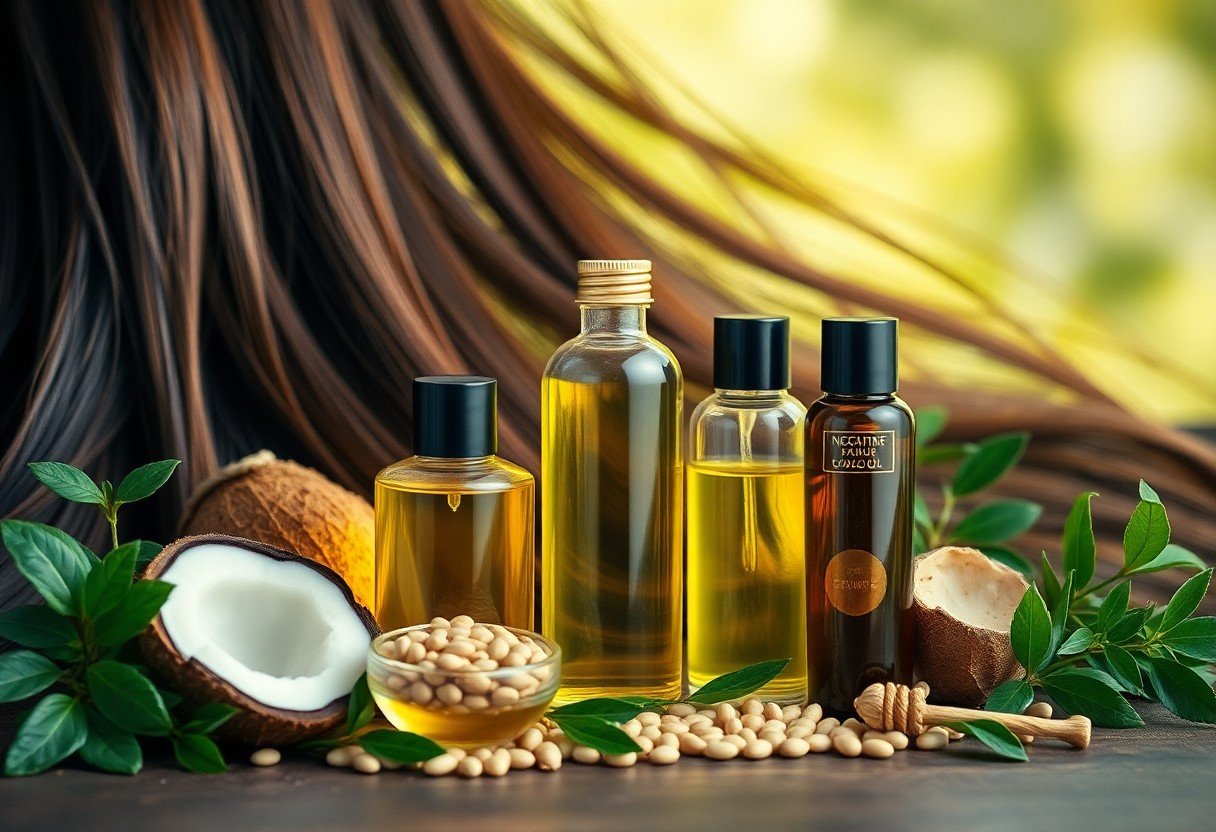With so many hair oils flooding the market, finding the right one for stimulating hair growth and increasing thickness can feel overwhelming. Your journey to healthier hair starts with understanding that not all oils deliver the same benefits. While some popular options like coconut and castor oil have gained attention, your specific hair needs should guide your choice. Using the wrong oil can lead to clogged follicles and stunted growth, making it vital to identify oils that match your hair type and concerns. You’ll discover that the best hair oil combines natural growth-promoting ingredients with proper application techniques to achieve optimal results.

Understanding Hair Growth
For healthy hair growth, you need to understand how your hair develops from the roots. Your hair follicles, located beneath the scalp, contain cells that produce keratin, the protein that makes up your hair strands. The growth process involves complex interactions between nutrients, hormones, and blood circulation, all working together to support your hair’s natural development.
The Hair Growth Cycle
Among the most fascinating aspects of hair growth is its cyclical nature. Your hair goes through three main phases: anagen (active growth), catagen (transition), and telogen (resting). Each strand follows this cycle independently, which is why you don’t lose all your hair at once. Knowing these phases helps you understand when to expect results from hair treatments.
Factors Affecting Hair Growth
On your journey to healthier hair, several factors influence growth and thickness:
- Genetics – inherited hair characteristics
- Nutrition – necessary vitamins and minerals
- Stress levels – impact on hormone balance
- Environmental factors – pollution and UV exposure
- Hair care routine – daily maintenance and protection
Knowing these factors helps you make informed decisions about your hair care routine.
Growth of your hair depends on various internal and external elements:
- Diet quality – protein and biotin intake
- Scalp health – clean and nourished foundation
- Medical conditions – thyroid issues or hormonal imbalances
- Age – natural changes in growth patterns
- Chemical treatments – potential damage to hair structure
Knowing how to address these factors can significantly improve your hair growth results.
Types of Hair Oils
Now, understanding different types of hair oils can help you choose the best one for your needs. Natural oils and important oils are the two main categories available for hair care. The right combination of these oils can transform your hair health dramatically.
| Oil Type | Benefits |
|---|---|
| Coconut Oil | Deep penetration, prevents protein loss |
| Argan Oil | Moisturizing, anti-frizz properties |
| Castor Oil | Promotes growth, thickens hair |
| Jojoba Oil | Balances scalp oils, prevents dandruff |
| Almond Oil | Strengthens hair, adds shine |
Commonly Used Oils for Hair
Below are the most popular carrier oils that have proven their effectiveness in hair care. Coconut oil, castor oil, and argan oil lead the pack with their remarkable ability to nourish your scalp and strengthen hair follicles. The combination of these oils can provide optimal results for your hair growth journey.
Essential Oils and Their Benefits
Above the carrier oils, important oils add powerful properties to your hair care routine. Rosemary, peppermint, and lavender oils are known to stimulate hair growth and improve scalp health. The proper dilution with carrier oils is important for safe application.
Hair experts recommend using important oils with caution as they are highly concentrated. Never apply important oils directly to your scalp as they can cause irritation. Your ideal mixture should contain 2-3 drops of important oil per tablespoon of carrier oil. Regular application can boost hair growth by up to 44% when used consistently.
Oil Combinations for Best Results
Now you can enhance your hair growth potential by combining different oils to create powerful hair treatments. Mixing two or more oils can provide complementary benefits, targeting multiple hair concerns simultaneously. Your custom blend might include coconut oil for penetration, castor oil for thickness, and rosemary oil for stimulating growth.
Blending Oils for Maximum Impact
The secret to creating effective hair oil blends lies in understanding proper ratios. Never exceed a 2% concentration of crucial oils in your mixture to avoid scalp irritation. Your basic formula should combine two parts base oil with one part growth-promoting oil, ensuring optimal absorption and effectiveness.
Carrier Oils vs. Essential Oils
Below you’ll find the fundamental difference between your carrier and crucial oils. Carrier oils form the base of your blend, while crucial oils provide concentrated active compounds. Your carrier oils include coconut, jojoba, and argan, whereas crucial oils encompass rosemary, peppermint, and lavender.
At the heart of successful oil blending is understanding that carrier oils are safe to use directly on your scalp, while crucial oils must always be diluted. Your carrier oils provide nourishment and moisture, making up 95-98% of your blend. Essential oils, though potent, should make up only 2-5% of the total mixture. Using undiluted crucial oils can cause severe scalp irritation or allergic reactions.

Application Techniques
All successful hair growth treatments depend on proper application methods. You should focus on massaging the oil directly into your scalp, using gentle circular motions with your fingertips. This technique helps stimulate blood circulation and ensures the oil penetrates deeply into your hair follicles for maximum benefits.
How to Apply Hair Oils
Beside warming the oil slightly for better absorption, you should section your hair and apply the oil methodically. Start from the scalp and work your way down to the tips. Never apply hot oil directly as it can burn your scalp. Use your fingertips to massage each section for 5-10 minutes, ensuring even distribution throughout your hair.
Frequency and Timing for Best Results
Timing your oil treatments correctly can maximize their effectiveness. Apply oil 2-3 times per week, preferably before bedtime, allowing it to work overnight. You can wrap your hair in a warm towel or use a shower cap to prevent oil from staining your pillowcase.
Another important aspect to consider is the duration of your oil treatment. For best results, you should leave the oil in your hair for at least 30 minutes to 8 hours. If you’re doing a daytime treatment, ensure you have enough time to properly wash and dry your hair afterward. Don’t leave oil in your hair for more than 24 hours as it can clog your pores and attract dirt.
Scientific Evidence on Hair Oils
Despite limited large-scale clinical trials, scientific research supports the effectiveness of certain hair oils for promoting growth and thickness. Studies show that oils containing bioactive compounds like fatty acids, vitamins, and antioxidants can penetrate the hair shaft and scalp, improving follicle health and stimulating growth factors. Research particularly highlights coconut oil, castor oil, and rosemary oil for their proven benefits in enhancing hair density and reducing hair loss.
Research on Efficacy
Before investing in hair oils, you should know that clinical studies have demonstrated promising results. A 2015 study published in the Journal of Cosmetic Science found that coconut oil reduced protein loss in both damaged and undamaged hair by up to 39%. Your hair can benefit from important fatty acids and nutrients that penetrate the hair shaft, leading to improved strength and thickness.
User Testimonials and Case Studies
Case studies and user experiences provide compelling evidence for hair oil effectiveness. Your results may vary, but documented cases show significant improvements in hair growth and thickness when using specific oils consistently.
- Study A: Castor oil users reported 15-20% increase in hair thickness after 12 weeks
- Study B: Rosemary oil showed comparable results to 2% minoxidil in a 6-month trial
- Study C: Coconut oil users experienced 28% reduction in hair breakage over 8 weeks
- Study D: Combined oil treatment resulted in 41% improvement in hair density
Plus, additional user testimonials reveal consistent patterns of success:
- 90-day trial: 76% of participants reported visible improvement in hair thickness
- 6-month study: Average hair growth rate increased by 35%
- Long-term usage: 82% users experienced reduced hair fall within 4 months
- Clinical observation: 67% improvement in scalp health and new hair growth

Tips for Choosing the Right Hair Oil
For optimal hair growth and thickness, selecting the right hair oil requires careful consideration of several factors. Focus on natural ingredients that align with your specific hair needs and concerns. Look for oils rich in crucial nutrients, such as vitamins E, A, and omega-3 fatty acids. Pay attention to the oil’s absorption rate and compatibility with your scalp type. This comprehensive approach will help you make an informed decision for your hair care routine.
Consider Your Hair Type
By understanding your hair type, you can choose the most effective oil for your needs. Fine hair benefits from lightweight oils like argan or jojoba, while thick or coarse hair responds well to heavier oils such as coconut or castor oil. Your scalp condition also plays a vital role – oily scalps work better with non-comedogenic oils, while dry scalps need more nourishing options.
Organic vs. Synthetic Oils
Below are key differences between organic and synthetic hair oils that affect your hair health. Organic oils contain natural nutrients and are free from harmful chemicals, while synthetic oils often include artificial fragrances and preservatives. Your choice impacts not only hair growth but also overall scalp health and environmental sustainability.
Even though synthetic oils might be more affordable, they can contain harmful ingredients that may damage your hair in the long run. Pure organic oils offer better nutrient absorption and fewer side effects, though they typically come with a higher price tag. You’ll find that organic options provide more consistent results and are less likely to cause scalp irritation or allergic reactions.
Summing up
Hence, your journey to healthier, thicker hair can be enhanced by choosing the right hair oil. Coconut oil stands out as your best option due to its deep penetrating properties and lauric acid content, followed by castor oil for its growth-promoting ricinoleic acid. You’ll find rosemary and peppermint oils particularly effective when combined with these carrier oils. For optimal results, you should apply your chosen oil 2-3 times weekly, massage it gently into your scalp, and leave it on for at least 30 minutes before washing.
FAQ
Q: What are the top natural oils proven to promote hair growth and thickness?
A: The most effective natural oils for hair growth include Castor oil (rich in ricinoleic acid), Coconut oil (penetrates hair shaft deeply), Rosemary oil (improves circulation), Peppermint oil (stimulates follicles), and Argan oil (packed with nutrients). These oils work by nourishing the scalp, strengthening hair roots, and providing necessary vitamins and minerals needed for healthy hair growth.
Q: How often should I apply hair oil for optimal growth results?
A: For best results, apply hair oil 2-3 times per week. Leave it on for at least 2 hours or overnight before washing. Consistent application allows the nutrients to penetrate deeply into the scalp and hair follicles. Massage the oil gently into your scalp for 5-10 minutes to stimulate blood circulation and enhance absorption.
Q: Which hair oil combinations work best together for maximum benefits?
A: The most effective combination is mixing Castor oil with Coconut oil (ratio 1:2) as a base, then adding 3-4 drops each of Rosemary and Peppermint necessary oils. Another powerful blend is Argan oil with Jojoba oil (ratio 1:1) plus 2-3 drops of Lavender oil. These combinations provide comprehensive nourishment and stimulate hair growth while improving thickness.
Q: What are the signs that indicate the hair oil is working effectively?
A: Positive signs include reduced hair fall within 4-6 weeks, new hair growth visible at the hairline after 8-12 weeks, improved hair texture and shine within 2-3 weeks, less breakage during combing, and a healthier scalp with reduced dandruff. Individual results may vary depending on hair type and consistency of application.
Q: Are there any specific precautions to take when using hair oils for growth?
A: Always perform a patch test before using new oils to avoid allergic reactions. Dilute necessary oils with carrier oils before application. Don’t over-apply oils as it can clog pores. Use warm, not hot oil, to avoid damaging the scalp. If you experience irritation, itching, or excessive hair fall, discontinue use and consult a dermatologist.

